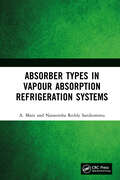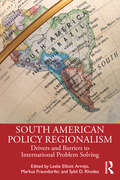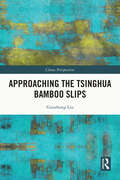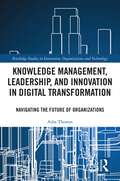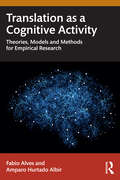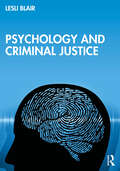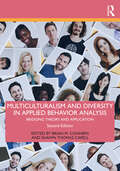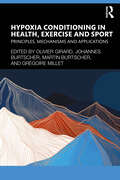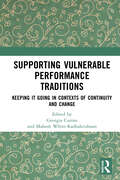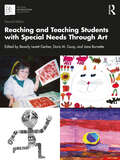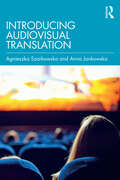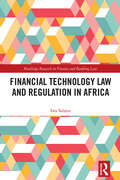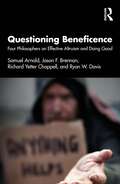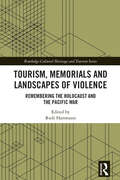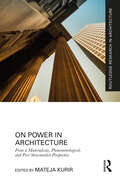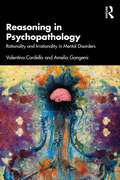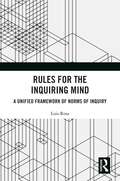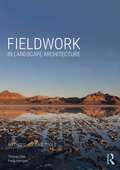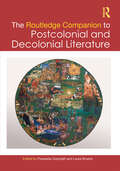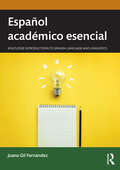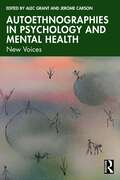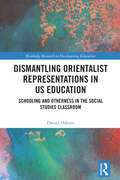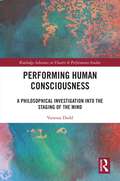- Table View
- List View
Absorber Types in Vapour Absorption Refrigeration Systems
by A. Mani Narasimha Reddy SanikommuThis book addresses the increasing energy demand and costs associated with the global refrigeration industry, primarily driven by the need for cooling. It proposes the substitution of vapour compression refrigeration systems (VCRS) with vapour absorption refrigeration systems (VARS), which operate on low-grade, renewable energy sources like solar, geothermal, and waste heat.Focusing on the absorber component of VARS, which plays a critical role in facilitating heat and mass transfer processes, the book provides a comprehensive overview of absorber configurations, including tray, packed bed, falling film, spray, bubble, and membrane absorbers. It offers guidance on selecting the appropriate absorber configuration considering their advantages and limitations in different operating conditions, as well as their numerical, experimental, and performance enhancement studies.The book will interest heating, ventilation, and air conditioning (HVAC) academic researchers, graduate students, and professionals involved in the advancement of sustainable refrigeration technologies, particularly absorber selection.
South American Policy Regionalism: Drivers and Barriers to International Problem Solving
by Leslie Elliott Armijo, Markus Fraundorfer, and Sybil D. Rhodes“Regional cooperation exists, but looks different in the global South than in the European Union,” claim the contributors to South American Policy Regionalism, which offers novel theory, methods, and Latin American case studies of joint governance efforts in nine international policy arenas, ranging from illegal drugs to artificial intelligence.Contrasting three major schools of thought in international relations (highlighting power, institutions, and ideas), this book introduces the idea of international policy regionalism as a framework for informed debate about international policy-sector interactions in a regional space. Beginning with a conceptual approach applicable to any world region, it includes a brief history of Western Hemisphere regionalism to aid in future cross-regional comparisons. An international group of contributors constructs rich narratives of the politics of Latin American policy sector evolution since the Cold War. Besides the aforementioned, included sectors span regional development banking, infrastructure planning, electricity distribution, migration governance, climate action, neglected tropical diseases, and food policies.This volume equips readers from various academic disciplines and the policy world to understand the relevance of core international relations theory for the analysis of policy sectors that cross national borders, both within Latin America and elsewhere, and especially throughout the global South.
Approaching the Tsinghua Bamboo Slips (ISSN)
by Guozhong LiuThis book provides a detailed introduction to the study of the Tsinghua Bamboo Slips, explaining the preservation and analysis of the artifacts and their significance in historical research of the pre-Qin period.The Tsinghua Bamboo Slips are a collection of Chinese texts inscribed on approximately 2,500 bamboo slips. They were excavated from a Warring States Period tomb and are now preserved at Tsinghua University. The book delves into the traditions and discoveries of bamboo manuscripts in China and discusses the preservation and research of the slips, covering the procedures of artifact processing, authentication, digitization, editing, and interpretation. The manuscripts are remarkable for their quantity, period of creation, and distinctive content coverage. They contain important historical documents that differ from or are missing from the extant literature. The analysis of these texts helps to unravel some of the unresolved mysteries in pre-Qin historical studies and illuminates scientific achievements of ancient China previously unknown to the world.This book is essential reading for scholars and students of Chinese studies, pre-Qin history, and early literacy. It will also appeal to general readers interested in ancient Chinese history and culture.
Knowledge Management, Leadership, and Innovation in Digital Transformation: Navigating the Future of Organizations (Routledge Studies in Innovation, Organizations and Technology)
by Asha ThomasDigital technologies have created an opportunity to bring together knowledge management, leadership, and innovation. Any business that wishes to thrive in today's competitive digital landscape must prioritize knowledge management. Leadership in the digital era is about leveraging digital tools to manage knowledge to attain a strategic advantage effectively. Thus, leadership is an essential and central element for knowledge creation, acquisition, utilization, and integration. As a result, this book will focus on knowledge management, leadership, and innovation, all intertwined but not covered in existing research. The book integrates knowledge management, leadership, and innovation into a unified framework in the era of digitization, exploring the benefits knowledge management can bring to organizations adapting to new digital requirements in a dynamic environment. It presents both theoretical and empirical research to synthesize these distinct disciplines in a cohesive body of work. The resulting model will create a useful framework to be applied to future research and further add to practical and theoretical implications. The book is primarily written for scholars, researchers, and advanced students with an interest in the three disciplines and associated fields.
Translation as a Cognitive Activity: Theories, Models and Methods for Empirical Research
by Fabio Alves Amparo Hurtado AlbirTranslation as a Cognitive Activity provides an overarching account of translation as a cognitive activity, from the pioneering use of think-aloud protocols as a sole technique used to investigate the translation process in the mid-1980s to the latest developments in the field. This book focuses on the main aspects of translation as a cognitive activity, including detailed descriptions of translation process research as well as research on translation competence and its acquisition. Providing thorough information into ways of studying translation as a cognitive activity by means of systematic references to empirical-experimental investigations, this innovative textbook promotes knowledge about the cognitive study of translation to related fields.With detailed explanations about models related to the functioning of the translation process and translation competence as well as an updated account of methods and instruments used in empirical-experimental research in translation, this is the ideal resource for students and translator trainers as well as novice and experienced translators.
Psychology and Criminal Justice
by Lesli BlairPsychology and Criminal Justice covers the ways that psychology intersects with the criminal justice system, from explaining criminal behavior to helping improve the three criminal justice pillars of policing, courts, and corrections.The book is divided into two parts. The chapters in Part One describe how different areas of psychology can help us understand why people commit crimes. The Basics of biopsychology, developmental psychology, behavioral psychology, social psychology, personality psychology, and psychopathy are presented first in their respective chapters. These initial chapters conclude with a section called Explaining Criminal Behavior that applies The Basics to help explain criminal behavior. Part Two of the textbook begins with a chapter on three topics in psychology that are particularly relevant to the criminal justice system: mental illness, trauma, and substance use. In the remainder of Part Two, there are two chapters each for policing, courts, and corrections. Each of these chapters discusses the ways principles from psychology can help with criminal justice processes, including police investigations and officer mental health, psychological evaluations for court proceedings, juror selection and decision making, behavior change, and the effects of imprisonment.After decades of overreliance on sociology-based theory and research, the field of criminal justice is looking to psychology for explanations and insight. This book is essential reading for upper-level undergraduate and graduate-level courses housed in both criminal justice and psychology departments.
Transnational Visual Activism for Women’s Reproductive Rights: My Body, My Choice
by Basia SliwinskaFocusing on art practices that advocate, raise consciousness, and educate about the human right to reproductive health, this book analyses and compares forms of feminist artivism to interrogate bodily rights while closely examining the lived experiences of women and their right of free choice.The transnational framing engages with resurgent imperialist and colonial ambitions across global politics and with the attempts at disrupting these positionings by prioritising feminist care as instrumental for democracy and social justice. Key foci of this book include the ways in which arts activism operates, and its strategies and methods related to, for example, the types of artistic practice employed, approaches to dissemination and reach, and engaging the public. The analysis of these topics interrogates the potential of arts activism to work while other forms of activism may stumble, leading social change in thinking, practice and, finally, legislation. Countries covered include Finland, Poland, Portugal, Latvia, the United Kingdom, Chile, Brazil, the United States, and Australia.The book will be of interest to students and scholars studying art history, art theory and practice, gender studies, and women’s studies.
Multiculturalism and Diversity in Applied Behavior Analysis: Bridging Theory and Application
by Brian M. Conners and Shawn Thomas CapellThis textbook provides a theoretical and clinical framework for addressing multiculturalism and diversity in the field of applied behavior analysis (ABA).Featuring contributions from national experts, practicing clinicians, researchers, and academics which balance both a scholarly and practical perspective, this book guides the reader through theoretical foundations to clinical applications to help behavior analysts understand the impact of diversity in the ABA service delivery model. This fully updated second edition includes updates applicable to the new BACB® Ethics Code for Behavior Analysts. Chapters contain case studies, practice considerations, and discussion questions to aid further learning. Accompanying the book is an online test bank for students and instructors to assess the knowledge they have learned about various diversity topics.This book is essential for graduate students and faculty in ABA programs, supervisors looking to enhance a supervisee’s understanding of working with diverse clients, and practicing behavior analysts in the field wanting to increase their awareness of working with diverse populations.
Hypoxia Conditioning in Health, Exercise and Sport: Principles, Mechanisms and Applications
by Olivier Girard Johannes Burtscher Martin Burtscher Grégoire MilletWhile severe hypoxia has detrimental health consequences, the controlled application of hypoxia can be protective and holds great promise as a performance-enhancing and therapeutic intervention. Hypoxia Conditioning in Health, Exercise and Sport: Principles, Mechanisms and Applications delivers an understanding of systemic and molecular mechanisms involved in hypoxia adaptations and examines the most promising forms of hypoxia conditioning with a view to create performance-enhancing strategies for athletes, as well as an offering an examination on clinical applications for numerous pathologies.This cutting-edge book examines how positive physiological adaptations not only acutely enhance tolerance to hypoxia but can also induce sustained health benefits. This has enabled the development and refinement of approaches utilizing hypoxia, strategies also termed hypoxia conditioning, to improve health and performance outcomes.By linking research with recommendations for real-world situations, this volume will serve as an invaluable resource for students, academics, exercise science professionals and sports medicine specialists, especially those in environmental physiology and coaching subjects.
Supporting Vulnerable Performance Traditions: Keeping it Going in Contexts of Continuity and Change
by Georgia Curran Mahesh White-RadhakrishnanSupporting Vulnerable Performance Traditions: Keeping it Going in Contexts of Continuity and Change explores endangered forms of performance from across the world, and the aspirations of practitioners, community members and researchers to keep these traditions going.Readers are provided with an ethnographically rich focus on specific performance contexts in diverse cultural worlds, including case studies that cover: Irish traditional song, ritual performances from southern India, Aboriginal ceremonial songs from northern and central Australia, Latin Catholic rites in multicultural Australia, and Asian-Portuguese syncretic dance in Sri Lanka. With contributors who are all scholars and/or practitioners of music, dance and other temporal arts, this book offers an inside view on the importance of these traditions for peoples' expressions of their distinct cultural identities and assertions of their uniqueness.Supporting Vulnerable Performance Traditions contains essential insights into musical cultures in the context of continuity and change, and will be of interest to researchers and postgraduates of ethnomusicology, anthropology, performance studies and Asian studies, as well as music historians and practitioners, and musicians and culture bearers across the world.
Reaching and Teaching Students with Special Needs Through Art
by Beverly Levett Gerber Doris M. Guay Jane BurnetteThis second edition of Reaching and Teaching Students with Special Needs Through Art is written for art educators, special educators, and those who value the arts for students with special needs. It builds on teachers’ positive responses to the first edition, and now combines over 700 years of the educational experience of arts and special educators who share their art lessons, behavior management strategies, and classroom stories. The revised second edition provides updated chapters addressing students with emotional/behavioral disabilities, learning disabilities, intellectual disabilities, physical disabilities, and visual and hearing impairments.The newly revised second edition includes chapters on students with autism spectrum disorder, preschool students, and students experiencing trauma. All chapters have been updated to include current definitions and language, recommended teaching strategies, art lesson adaptations, behavior management strategies, and references to related chapters. Follow-up activities are provided for further insights into each group of students. A new summary chapter connects how the authors’ collaborations resulted in changes to two professional organizations. Since the first edition, many of the featured authors established the new Division of Visual and Performing Arts Education (DARTS) at the Council for Exceptional Children (CEC) and earlier, formed a new National Art Education Association (NAEA) Interest group—Special Needs in Art Education (SNAE), now Arts in Special Education (ASE).This edition is ideal for preservice arts methods courses and education courses on accessibility and inclusion at the undergraduate and graduate levels. It continues to offer current yet proven best practices for reaching and teaching this ever-important population of students through the arts.
Introducing Audiovisual Translation
by Agnieszka Szarkowska Anna JankowskaThis user-friendly textbook offers comprehensive insights into all facets of audiovisual translation and media localisation.Serving as a comprehensive guide spanning seven chapters, it begins by introducing audiovisual translation (AVT). It goes on to explore the historical backdrop and highlights the distinctions from traditional written text translation. The authors expertly navigate you through the primary AVT modalities: interlingual subtitling, dubbing, voice-over, subtitling for the deaf and hard of hearing, live subtitling, and audio description.A blend of theoretical concepts and practical, real-world examples in various languages ensures a seamless understanding of the fundamental principles of AVT. The book clearly guides you through the most important aspects of each type of AVT.Designed for those exploring various AVT forms, budding audiovisual translators, and those interested in contemporary AVT trends and research, this book is an invaluable resource for students of translation and linguistics and for educators in AVT across higher education and media localisation programmes.
Financial Technology Law and Regulation in Africa (Routledge Research in Finance and Banking Law)
by Iwa SalamiThis book comprehensively analyses financial technology law and regulation in Africa and provides domestic and regional perspectives on regulating FinTech in Africa. It studies policy considerations that can assist African policymakers in facilitating a balanced regulatory approach that does not stifle financial innovation.The growth of financial technology in Africa presents huge opportunities for inclusive growth on the African continent. Digital finance, which sits at the heart of financial technology, could be key to placing Africa back on the economic recovery trajectory after the COVID-19 crisis, facilitating its speed in achieving the UNSDG 2030 goals and setting the continent on course to meet its African Union Agenda 2063. This book:- Examines mobile financial services, crowdfunding, crypto-assets, digital currencies including central bank digital currencies, decentralised finance and open banking and finance, all from an African perspective;- Explores the status of regulation in these areas in Africa, highlighting areas where regulation is lacking, inadequate and in need of reform;- Highlights pragmatic approaches to regulation such as including the adoption of regulatory sandboxes and regulatory technology and discusses requirements for the adoption of supervisory technology in Africa;- Scrutinises the implications of developments in the FinTech space in Africa for international security and economic and financial stability.Placing Africa in the global context, the book argues for an international effort to understand the global dimensions of FinTech developments so that robust and applicable global regulatory frameworks can be applied in developing parts of the world. It will provide useful insights to investors, policy makers and entrepreneurs. It will also be essential reading for students and researchers in the field of technology, public policy, regulatory policy, financial policy, banking, and finance law.
Questioning Beneficence: Four Philosophers on Effective Altruism and Doing Good
by Samuel Arnold Jason F. Brennan Richard Yetter Chappell Ryan W. DavisEffective Altruism is a movement and a philosophy that has reinvigorated the debate about the nature of beneficence. At base, it is the consistent application of microeconomic principles to beneficent action. The movement has exposed that many forms of giving do little good (or do active harm), but others do tremendous good.Questioning Beneficence uses Effective Altruism as a launch pad to ask hard questions about beneficence more generally. Must we be Effective Altruists, or are Effective Altruism and the ideas driving the movement a mistake? How much should we give—if anything— and how should we give it? What are the respective roles of different kinds of institutions? Is charity anti-democratic and do billionaire philanthropists have too much power? Is Effective Altruism just utilitarianism in disguise?Questioning Beneficence is written by four philosophers, each with distinct points of view. It introduces a new standard for debating ideas in philosophy as each author poses and answers three questions and each of his three co-authors responds to those questions in turn. Finally, the first author replies to his co-authors’ responses. Throughout the book, there is a spirit of curiosity, intellectual risk taking, and truth-seeking, rather than point-scoring and one-upmanship. This book demonstrates what open-minded, real dialogue on an important issue can be at its very best.Key Features: Introduces a new roundtable format for philosophical debates: each of four authors takes the lead in constructing and answering three questions, each co-author then responds, and the first author then replies to the others’ responses. Explores salient philosophical questions raised by beneficence, like Can philanthropy be undemocratic? Why are people so bad at charity and what can we do about it? How important is beneficence compared to other values? Can Effective Altruism be part of a meaningful moral life? Consistently written in a clear and engaging style, suitable for both undergraduate students and curious general readers
Tourism, Memorials and Landscapes of Violence: Remembering the Holocaust and the Pacific War (ISSN)
by Rudi HartmannThe book focuses on tourism, memorial sites of the Holocaust and the Pacific War and the management practices for the visitors that they attract.It provides an account of landscapes of violence as millions of people in Central and Eastern Europe, China, Japan and the United States were affected by wars, conflicts and crises. A special feature of the book is to reconstruct the changing management practices and the significance these heritage sites have attained for different visitor groups and the local populations, and to critically assess the current situation 80 years after the events. The book discusses the new directions of dark tourism, thanatourism and dissonance in heritage tourism in contemporary tourism research. Several case studies and in-depth analysis of memorial sites allow the reader to understand the consequences of past or ongoing policy changes.This book will appeal to students and researchers in the fields of tourism, heritage, history, cultural studies, anthropology and human geography.
On Power in Architecture: From a Materialistic, Phenomenological, and Post-Structuralist Perspective (Routledge Research in Architecture)
by Mateja KurirArchitecture has always been a decisive manifestation of power. This volume represents an attempt to question and reflect on the relationship between power and architecture from three philosophical perspectives: materialistic, phenomenological and post-structuralist.This collection opens an interdisciplinary investigation that aims to reflect on architecture and its interconnectedness with power within philosophy and cultural theory at large while presenting these concepts using practical examples from the built environment. Internationally recognised authors – philosophers, architectural theorists and historians – Andrew Benjamin, Andrew Ballantyne, Mladen Dolar, Hilde Heynen, Nadir Lahiji, Jeff Malpas, Dean Komel, Elke Krasny, Robert Pfaller, Gerard Reinmuth, Luka Skansi, Douglas Spencer, Teresa Stoppani and Sven-Olov Wallenstein present their reflections in original unpublished essays and interviews. In the presented works, architecture is combined and transgressed by philosophy in a new discussion that focuses only on power. The contributions in this collection open a variety of architectural questions, one of the central among them being the impact of neoliberal capitalism on architecture. Architecture, with its implications on the complex contemporary political and social reality, is severely changing our space and, more globally, our environment. A reflection on the multilayered relation between architecture and power has never been as topical as it is today.This book will, therefore, be of interest to students, researchers and academics or professionals within the fields of architecture, philosophy, sociology, political sciences and cultural sciences.
Reasoning in Psychopathology: Rationality and Irrationality in Mental Disorders
by Valentina Cardella Amelia GangemiReasoning in Psychopathology adopts a pragmatic conception of reasoning, demonstrating how people with mental disorders develop characteristic strategies of reasoning depending on the particular disorder they have and the emotions they experience.The book argues that these strategies are perfectly rational, as the individuals are using reasoning as a tool at the service of their goals. Through the analysis of the typical reasoning styles of very different psychopathologies, from anxiety disorders to obsessive-compulsive disorder, from schizophrenia to depression and paranoia, the book argues that mental disorders can affect common sense, or social cognition, while rationality is usually preserved. Supported by recent research, the authors claim that people with mental disorders follow the same rules as healthy people, and that in some cases, when the specific topic of their disorder is at stake, they can be even more logical than healthy people.It is a must-read for all researchers and students of rationality from cognitive psychology, psychiatry, and philosophy backgrounds.
Rules for the Inquiring Mind: A Unified Framework of Norms of Inquiry
by Luis RosaThis book concerns the nature and the norms of inquiry. It tackles not only philosophical issues regarding what inquiry is, but also issues regarding how it should and should not be executed. Roughly put, inquiry is the activity of searching for the true answers to questions of our interest. But what is the difference between empirical and armchair inquiry? And what are the right and the wrong ways to inquire? Under what conditions should one start inquiring? Which questions are such that one should not inquire into them? The book offers answers to these questions. It argues that competent armchair inquiry only makes explicit what was already implicit—the inquirer already had the answer to her question before inquiring into it, though this was not explicit to her. It also argues that we should avoid inquiring into questions whose answers are unknowable to us, in the instrumental sense of 'should', and that different modes of inquiry are called for, depending on which type of information is available to the subject. These answers are rigorously argued for, and they stem from a unified framework for modeling the activity of inquiry.
Fieldwork in Landscape Architecture: Methods, Actions, Tools
by Thomas Oles Paula HorriganFieldwork in Landscape Architecture: Methods, Actions, Tools addresses the initial encounters between landscape designer and landscape site, an encounter that determines the entire course of the design process. The book offers a four-part framework (‘what you seek,’ ‘what you carry,’ ‘how you act,’ and ‘what you leave behind’) for learning and practicing fieldwork as a landscape design skill, and contains over sixty first-person accounts by international practitioners and educators about the methods and tools they bring to the field, from drones to dance. The first title of its kind, Fieldwork will be an invaluable resource for students and instructors of landscape architecture, as well as for anyone interested in the practice and experience of direct encounter with real places.
The Routledge Companion to Postcolonial and Decolonial Literature (Routledge Literature Companions)
by Praseeda Gopinath Laura BrueckWorking within a global frame, The Routledge Companion to Postcolonial and Decolonial Literature considers postcolonial and decolonial literary works across multiple genres, languages, and both regional and transnational networks. The Companion extends beyond the entrenched hegemony of the postcolonial or Anglophone novel to explore other literary formations and vernacular exchanges. It foregrounds questions of language and circulation by emphasizing translation, vernacularity, and world literature. This text expands the linguistic, regional, and critical foci of the emergent field of decolonial studies, pushing against the normative currents of postcolonial literary studies, and offers a critical consideration of both.The volume prioritizes new literatures and critical theories of diasporas, borderlands, detentions, and forced migrations in the face of environmental catastrophe and political authoritarianism, reframing postcolonial/decolonial literary studies through an emphasis on multilingual literatures. This will be a crucial resource for undergraduate and graduate students of postcolonial and decolonial studies.
Español académico esencial (Routledge Introductions to Spanish Language and Linguistics)
by Juana Gil FernándezEspañol académico esencial es una guía práctica para todas aquellas personas que necesiten expresarse con corrección, por escrito u oralmente, en el contexto académico.El libro ofrece más de 1000 estructuras y fórmulas lingüísticas y comunicativas útiles para redactar un trabajo académico-científico, o bien para preparar una presentación oral, organizadas todas ellas siguiendo las fases sucesivas que conlleva un proyecto de investigación. Se trata de una obra sumamente práctica que incluye, para facilitar el autoaprendizaje, 120 ejercicios con sus correspondientes soluciones. Tanto los numerosos ejemplos como las actividades propuestas ayudan a los lectores a abordar las distintas tareas propias del entorno académico, tales como escribir una tesis o un artículo. Además, en el libro se proporcionan claves acerca de cómo elegir y combinar al vocabulario apropiado, reproduciendo, asimismo, muestras de diferentes textos académicos.Al estar centrada en los rasgos del discurso académico-científico comunes en gran medida al ámbito docente, al de la investigación y al laboral, la obra ayudará a los hablantes de español, tanto nativos como no nativos con nivel de lengua avanzado, a dominar el español académico-científico necesario para desenvolverse en cualquiera de esas esferas.Español académico esencial is a practical guide for those who need to refine and master how they express themselves in Spanish, both in writing and orally, within an academic context.This book presents more than 1,000 linguistic and communicative patterns which are useful for writing an academic-scientific paper or preparing an oral presentation, organised according to the successive phases that a research project involves. It is highly practical, with 120 exercises and their corresponding solutions included to facilitate self-learning. The numerous examples, as well as the exercises help readers tackle the different tasks they are likely to encounter in an academic context, such as writing a dissertation or an article. Additionally, Español académico esencial offers helpful tips and resources, such as samples of different academic texts and guidance on how to choose and combine the appropriate vocabulary.The book will aid both native and non-native advanced users of Spanish in mastering academic Spanish, whether in their studies, research, or work environment, through its focus on characteristics of academic discourse that are broadly common to both scholar and scientific-technical discourse.
Building-Integrated Photovoltaics: A Technical Guidebook
by Nuria Martín Chivelet Costa Kapsis Francesco FrontiniBuilding-integrated photovoltaics (BIPV) is an innovative technology offering a variety of building envelope solutions, materials, and colours for virtually any building surface. These BIPV products generate on-site renewable electricity, turning buildings from energy consumers to producers. BIPV is expected to play an indispensable role in the transition towards decarbonisation and energy resilience of cities, effectively reducing energy consumption and greenhouse gas emissions. Lack of knowledge and guidance on designing BIPV systems has hindered this technology's widespread adoption and creative applications. As a remedy, this guidebook presents best practices and decision-making processes for efficient and resilient architecture. Featuring more than 50 annotated reference drawings—roofs, solar shadings, rainscreen façades, curtain walls and double skin façades—and 24 international BIPV case studies, the guidebook provides building professionals with the technical knowledge and inspiration to implement BIPV technology in the built environment.
Autoethnographies in Psychology and Mental Health: New Voices
by Alec Grant Jerome CarsonThis autoethnographic volume gathers a multiplicity of different voices in autoethnographic research from across psychology and mental health disciplines to address topics ranging from selfhood, trauma, emotional understanding, clinical psychology, and the experience of grief.Edited by two leading figures, this volume broadens the concept of psychology beyond its conventional, mainstream academic boundaries and challenges pre-conceived and received notions of what constitutes ‘psychology’ and ‘mental health’. This book collects new autoethnographic writers in psychology and mental health from across as diverse a range of disciplines and, in doing so, makes a strong case for the legitimacy of subjectivity, emotionality and lived experience as epistemic and pedagogic resources. The collection also troubles the related concept of ‘mental health.’ In contemporary times, this is either biomedically over-colonised (welcomed by some but resisted by others), often regarded by lay and professional people alike in terms of an ‘ordered or disordered’ binary (comforting for some but associated with stigma and othering for others), or, at worst, is reduced to a set of hackneyed memes – the stuff of Breakfast television (well-intentioned and undoubtedly reassuring and helpful for some but patronising and naïve for others). Overall, the volume promotes the subjective and lived-experiential voices of its contributors – the hallmark of autoethnographic writing.Autoethnographies in Psychology and Mental Health will be of interest to psychology and mental health students and professionals with an interest in qualitative inquiry as it intersects with autoethnography and mental health.
Dismantling Orientalist Representations in US Education: Schooling and Otherness in the Social Studies Classroom (Routledge Research in Decolonizing Education)
by Daniel OsbornThis book examines the evolving role played by the social studies classroom in shaping national identity and contributing to Orientalism, which depicts the peoples of the Middle East as “the Other” relative to those of the United States and Europe.Building upon the momentum of critical approaches to examining the nature of knowledge, the role of schools in society, and the trends within social studies education and its hidden curriculum, the volume crucially shifts the focus toward a more global emphasis, examining the nature of Orientalism and the school as a setting where Orientalist logic and assumptions about the Middle East and its inhabitants are reified. Focusing on the ecosystem of social studies knowledge production and working within the sociology of knowledge, it traces this evolution across the 19th, 20th, and 21st centuries.A novel and unique exploration of knowledge construction, and presenting a vision for a more nuanced and multifaceted portrayal of the Middle East that corrects for the deleterious aspects of Orientalism while avoiding a romanticized apologetic, it will appeal to scholars, researchers, and educators with interests in decolonizing education, social studies education, the history of education, and race and ethnicity studies.
Performing Human Consciousness: A Philosophical Investigation into the Staging of the Mind (ISSN)
by Vanessa DoddIs the mind like a theatrical performance? This comparison has often been used as a conceptual tool by neuroscientists, philosophers, and psychologists in trying to understand what constitutes the human mind, and in particular how the comings and goings and the character transformations on the stage and in the scripted text give us visible access to the hidden workings of the human mind.Performing Human Consciousness makes use of this metaphor to explore the variety of ways in which the private thoughts and feelings we all have bring into play many aspects of persistent philosophical questions over how the essentially private world of personal experiences can relate to and communicate with the common public world. To investigate this generalisation in more detail, the author brings into play her own conscious experiences by making use of an auto-inscribed play Being Me. Through this dramatic medium she seeks to show in detail how phenomenal consciousness is captured through the dramatic play text and thereby made known to others through performance of that text. Broadening out her argument further, the author then embarks on an enquiry into a selection of play texts from an historical variety of perspectives, from the early Greek and Mediaeval dramas, through to the Symbolist period and onwards to the present day, demonstrating the variety of ways in which they illustrate her argument. This book will be of great interest to students and scholars of theatre & performance and scriptwriting.
